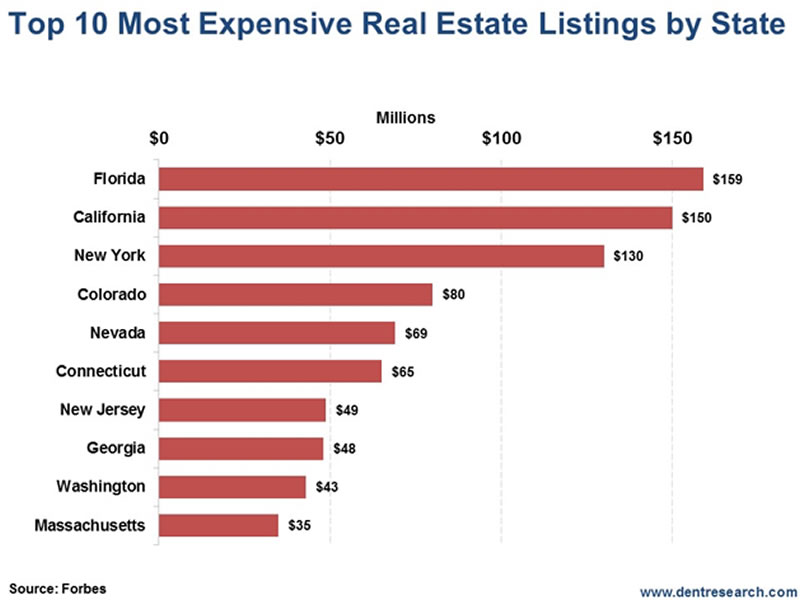The U.S. Housing Market Bubble Appears to Have Peaked!
Housing-Market / US Housing Jun 29, 2016 - 12:33 PM GMTBy: Harry_Dent
 Two weeks ago, I wrote about an upcoming New York City condominium listing for $250 million. I mention this because, as I’ve explained before, it’s always the tallest buildings and priciest condos to get hit during major downturns.
Two weeks ago, I wrote about an upcoming New York City condominium listing for $250 million. I mention this because, as I’ve explained before, it’s always the tallest buildings and priciest condos to get hit during major downturns.
Just look at the early 1930s and mid-1970s marking peak bubbles if you don’t believe me!
You’ll understand, then, why I smiled when I saw a Forbes slideshow called “The Little Black Book of Billionaire Secrets,” featuring the most expensive homes in each of the 51 states, including Washington D.C.
North Dakota held the honor of the least expensive home, at just under three million dollars, now that the fracking boom has burst. The most expensive home was not in Manhattan, but in Florida – Palm Beach – at $159 million.
That’s a wide range of values, where the top house is 57.2 times the lowest of the high!
A number of top homes in the $4 million to $11 million range, not surprisingly, were found in the Midwest and Southeast – from Ohio and Indiana to Alabama, Mississippi and Arkansas.
I was surprised that D.C. only came in at $12 million, given the exorbitant cost of homes there and the government bubble in hiring. I thought top lobbyists could afford more!
South Carolina, my home state, came in at a very substantial $24 million, with Virginia a bit higher at $25 million.
Texas has always been a lower-cost state, but it attracts major corporate headquarters and the very affluent due to its zero state income tax and more affordable housing. Its top home came in at $28.5 million.
Arizona is a haven for wealthy Californians and its top home was $32 million, as is Hawaii at $35 million.

If we look at the top 10 most expensive states by real estate listing, as you can see in the chart above, it starts with Massachusetts at $35 million, then Washington State at $43 million – likely a software mogul. Next comes Georgia – another city for multinational corporate headquarters like Coca-Cola – with the top home listed for $48 million in an otherwise affordable city, and then New Jersey (no surprise there) at $48.88 million.
Then we get into the heavyweights: Connecticut, perhaps the most beautiful of New York suburbs, is ranked as a big step up in price, at $65 million. Nevada is a bit of a surprise at $69 million – likely carrying an appeal to foreign buyers.
Colorado, not surprisingly, holds some of the most expensive listings at $80 million, which almost have to be in Aspen or Snowmass.
The top three break the ultimate $100 million barrier, starting with New York at $120 million. That is the most expensive condo in Manhattan listed in 2016, after a number have gone for $100 million-plus since 2014. But it has that $250 million listing coming up that will make all others before it look like chump change if it sells. California is not surprising at $150 million, likely in the Hollywood Hills.
But the top spot goes to the zero state income tax Florida and its billionaire haven in Palm Beach… at a cool $159 million.
My bet is that this unprecedented real estate bubble will burst long before that $250 million condo makes it on the listings (if it ever does) at that price.
It’s clearly time to be a seller rather than a buyer, especially in the higher end where prices are going the most nuts!
Harry
Follow me on Twitter @HarryDentjr
Harry studied economics in college in the ’70s, but found it vague and inconclusive. He became so disillusioned by the state of the profession that he turned his back on it. Instead, he threw himself into the burgeoning New Science of Finance, which married economic research and market research and encompassed identifying and studying demographic trends, business cycles, consumers’ purchasing power and many, many other trends that empowered him to forecast economic and market changes.
Copyright © 2016 Harry Dent- All Rights Reserved Disclaimer: The above is a matter of opinion provided for general information purposes only and is not intended as investment advice. Information and analysis above are derived from sources and utilising methods believed to be reliable, but we cannot accept responsibility for any losses you may incur as a result of this analysis. Individuals should consult with their personal financial advisors.
© 2005-2022 http://www.MarketOracle.co.uk - The Market Oracle is a FREE Daily Financial Markets Analysis & Forecasting online publication.



